Key Document Hearings: Treatment of Cham and Vietnamese Minorities
Today, February 23 2016, marked the first day of the Key Document Hearings, in which the Co-Prosecutors and the Civil Party Lead Co-Lawyers presented those documents that they deemed most crucial for assessing the treatment of the Vietnamese and Cham minorities. They key document hearings will continue tomorrow with the remainder of the Civil Party Lead Co-Lawyers presentation, after which the Khieu Samphan Defense Team will present the defense’s most relevant documents to the Chamber.
Co-Prosecution: Treatment of the Cham
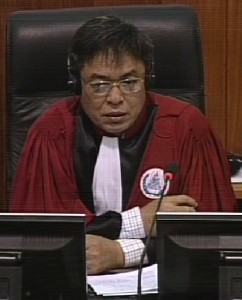
Trial Chamber President Nil Nonn
At the beginning, the Trial Chamber President Nil Nonn announced that today, tomorrow and Friday the Key Documents Hearing in relation to the treatment of the Cham, Vietnamese and former officials of the Khmer Republic would be conducted. The Trial Chamber Greffier confirmed the presence of all parties, except international Nuon Chea Defense Counsel Victor Koppe, who was absent without reason. Nuon Chea followed the proceedings from the holding cell.
The Chamber informed the parties that the Chamber had received an e-mail for the admission of a document by the Co-Prosecutors pursuant to 87 (4). The request had been made on November 15 2015. The Chamber would deliberate on this issue during the break time.
The Chamber had reiterated its preference to use only those documents that were directly related. The parties might use Written Record of Interview and Civil Party Applications and the Chamber permitted documents that were relevant to national policies (although this might be more appropriate the section about the role of the accused). Only admitted documents may be used and as regards torture tainted documents, he reminded the parties to adhere to E350/8.[1] He said that the Co-Prosecutors, Lead Co-Lawyers for Civil Parties and the Khieu Samphan Defense Team had indicated that they wished to present their key documents and had sent their list. The Defense Team for Nuon Chea had indicated that it neither wished to present key documents, nor respond to the documents presented by other parties.
The floor was then handed to the Co-Prosecutors to present their key documents. Khieu Samphan Defense Counsel Anta Guissé remarked that there had been a delay from the side of the Co-Prosecutors to submit the documents, which had an impact on the Defense Team and, she assumed, the Civil Party Lead Co-Lawyers as well. If documents were provided three hours later than the deadline, this made the team work even more beyond the limit than before.
Senior Assistant Co-Prosecutor clarified that the list for the Cham had been uploaded twenty minutes after the deadline. The submission of the rest of the documents had been delayed due to technical issues, but since they had a day on Thursday to prepare the responses, he did not see how this impacted the Defense Team.
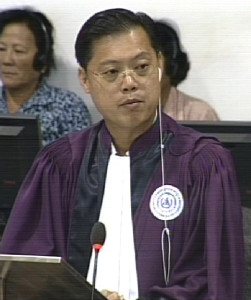
National Deputy Co-Prosecutor Seng Bunkheang
National Deputy Co-Prosecutor Seng Bunkheang started by referring to Ben Kiernan’s book “The Pol Pot Regime”, and more specifically to Chapter 7 (“Ethnic Cleansing”),[2] which contained a “lengthy section on the treatment of the Cham”. Kiernan had based this section mainly on interviews of Cham that were conducted mostly in 1980. Kiernan first described who the Cham are, namely a minority that originated in Champa and lived in Cambodia. He also described the migration of Cham.[3] Kiernan also stated that the Cham person Sos Man had joined the Indochina Communist Party and joined the CPK later. He had worked together with Mat Ly. He submitted that Cham people in the Southwest Zone were the first victims to mistreatment following orders by Ta Mok.[4] They had been known as depositees even after having returned to their home villages in 1974.[5] This suggested that this term was used for racial reasons and not geographic ones. Kiernan had also said that there was a discriminatory intent by the Democratic Kampuchea leaders. The Cham were considered an obstacle, according to a source quoted by Kiernan.[6] Kiernan had further cited the “Decisions concerning the Line of the Cooperative”, which indicated that the Cham people should not be allowed to be concentrated in one area. Kiernan argued that this seemed to have been the earliest decision by the Center to disperse Cham. Arrest of Cham began in November 1973, after some Cham had carried out demonstrations against the suppressions of their beliefs. On this occasion, at least 300 Cham had been arrested, consisting mostly of respected religious leaders in Krouch Chhmar. He had also written that Pol Pot visited the East Zone, after which a movement was dispended. Moreover, Kiernan said that Cambodian’s largest minority – the Cham – were located in Kampong Cham in region 21, including Krouch Chhmar. The Cham in this region were one of the strongest supporters of the revolution until 1975.[7] Mr. Bunkheang cited a 30 November telegram to Pol Pot that was also received by Nuon Chea in support of this argument.[8]
Kiernan also cited sources in which a few people had been blamed for following Pol Pot’s orders. Kiernan had described what happened to Mat Ly and his father Sos Man, namely that two strangers arrived at Man’s house and “offered him medicine” – and that after taking it, Mat Ly’s father died. Despite staying on the committee, it was said that Ly was “like a phantom” and did not have any power.[9] Mr. Bunkheang then referred to several interviews of Mat Ly that, he said, the Defense Team had ignored so far.[10]
Indeed, Mat Ly had confirmed that he was CPK cadre. However, he also described the persecution of Cham after June or July 1975. According to Mat Ly, they had cut the hair and gathered the sarongs, burned them, and the killing of “almost everyone”.[11] Mat Ly had further talked about the gathering an killings of Cham. Mat Ly had said that 500,000 Cham had been killed, which were “more than pigs, even more than water buffalos”. Mat Ly had also described a East Zone Party Congress in which Pol Pot asked him whether he could recite the Qur’an. Pol Pot had further talked to him about a possible rebellion by the Cham, which Mat Ly had warned of, and the denial by Pol Pot.[12]
Trial Chamber President Nil Nonn
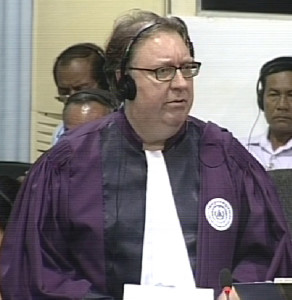
International Senior Assistant Prosecutor Dale Lysak
He then handed the floor to his international colleague Dale Lysak. Mr. Lysak started his presentation by referring to a publication by Farina So: “An Oral History of Cham Muslim Women in Cambodia under the Khmer Rouge”.[13] She had said that the Khmer Rouge intended the assimilation of all groups in Cambodia and destroyed all Qur’ans. Moreover, she had said that around 700,000 Cham were living in Cambodia before the Khmer Rouge regime. In her chapter “The destruction of the Cham community”, she had indicated that the Khmer Rouge had closed down and destroyed mosques and statues. After banning religions, the Khmer Rouge had proceeded to erase their ethnic identity by forcing assimilation and “khmerization”.[14] Similar evidence, he said, was given by Kiernan, who had talked about the plan to eradicate all ethnic minorities and referred to a 1980 interview with Ouk Bunchhoeun. The latter had said in this interview that the plan was to only have one race: the Khmer.[15] At this point, the President adjourned the hearing for a break.
After the break, the President announced that the document that the Co-Prosecution had requested was admitted.[16] He then gave the floor back to the Co-Prosecutors.
Mr. Lysak referred to several documents that suggested that Cham people were forced to eat pork and killed in several provinces (Banteay Beanchey, Steung Trong, Kratie).[17]
Mr. Lysak then turned to the topic of whether the Khmer Rouge killed those Cham people who were considered bad elements or whole families indiscriminately. He provided several documents to show that these executions took place, because the Cham were seen as an enemy regardless of whether they had committed wrongdoings. He pointed to several regions where such indiscriminate killings are alleged to have occurred. He cited sources that indicated he mass killings of 500 people being arrested and brought to Wat O Trakuon, who were executed there, as well as sources indicating the killings of whole Cham families, including children. He said that, as shown by Ysa Osman’s research, “many thousands of Cham” were killed.[18] Mr. Lysak further referred to killings and arrests of Cham people in Kampong Siem. He quoted statements that referred to meetings in which it was discussed that “Cham are the enemies of Angkar, because they plan to rebel, so Angkar has to smash them. If any Cham remains, this has to be reported, because they have to be swept clean”. Mr. Lysak also attempted to show that arrests of Cham people were widespread in Kampong Siem.[19]
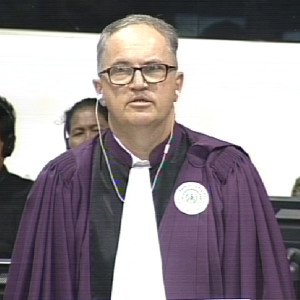
International Deputy Co-Prosecutor William Smith
Co-Prosecution: Treatment of the Vietnamese
He then gave the floor to Deputy Co-Prosecutor William Smith, who indicated the key documents relating to the treatment of the Vietnamese. He said that they had selected around 30 documents, which were mainly contemporaneous documents of Democratic Kampuchea. These documents related to genocide charge, crimes against humanity and to the grave breaches of Geneva Convention. With this selection of documents, he tried to show that not only Vietnamese soldiers, but also Vietnamese civilians were considered enemies and therefore killed. They were viewed as “unwanted outsiders” and thus expelled or arrested. He argued that these documents showed that the Khmer Rouge had a very broad understanding of the term “enemy” and that everyone who was considered an enemy must be killed. He further submitted that the Vietnamese were targeted because of their race.[20]
At this point, the President adjourned the hearing for the lunch break.
After the break, Mr. Smith requested an additional 45 minutes that the Co-Prosecution could use tomorrow. The Civil Party Lead Co-Lawyers would need an hour today.
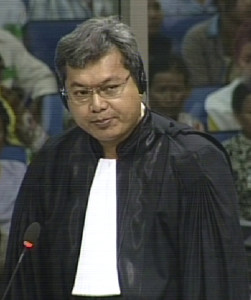
National Civil Party Lead Co-Lawyer Pich Ang
Mr. Smith then proceeded to cite documents that, he said, showed the discrimination of the Vietnamese in comparison with Khmer people during the Khmer Rouge and the policy of targeting not only Vietnamese soldiers, but also civilians. Furthermore, he cited those documents to show the arrests of civilian Vietnamese and the knowledge of the leadership about these arrests. He submitted that in many cases, the minimum protection as granted under the Geneva Convention had been breached. Mr. Smith alleged that these documents showed a policy to kill combatants or civilians of Vietnamese race.[21] He then turned to the work of several experts that also served to show the policy of the Khmer Rouge to target the Vietnamese and to proof that Vietnamese were more severely affected by suppression, arrests and executions than Khmer people.[22] After this presentation, the President adjourned the hearing for a break.
Civil Party Lead-Co Lawyers: Treatment of the Cham and the Vietnamese
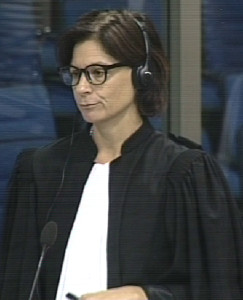
International Civil Party Lead Co-Lawyer Marie Guiraud
In the last session, the floor was granted to the Civil Party Lead Co-Lawyers. National Lead Co-Lawyer Pich Ang commenced by indicating the most relevant documents relating to the treatment of the Cham. He referred to eight Civil Party applications and supplementary information forms that served to highlight the mistreatment of the Cham people: they were forced to eat pork, banned from practicing their religion and speaking their language, and arrested and executed.[23] When Pich Ang finished his presentation he gave the floor to his international colleague. Marie Guiraud focused on the forced evacuations of the Cham people and presented relevant documents to this.[24] With this, Marie Guiraud finished her presentation and gave the floor back to Pich Ang, who indicated the key documents for the treatment of the Vietnamese.[25] Since it was already time for recess, he requested to be able to present the key documents for ten more minutes tomorrow morning, which was granted. The hearing will resume tomorrow, February 23 2016, at 9 am.
[1] E315/2.
[2] E3/1593, at 01150133-51 (EN); 00637752-7809 (KH), 00639020-9063 (FR).
[3] Ibid., at 00637752-54 (KH), 01150133-34 (EN), 00639020-22 (FR)
[4] Ibid., 00637759-60 (KH), 01150136 (EN), 00639025-26 (FR).
[5] 00637761 (KH), 01150136 (EN), 00639027 (FR
[6] 00637763-65 (KH), 01150137 (EN), 00639028-30 (FR)
[7] 00637767-68 (KH), 01150138 (EN), 00639031-32 (FR)
[8] E3/154
[9] 006377 -701150140 (EN), 0 ..36-37 (FR)
[10] E3/390, and E3/2780R, E3/8781R; E3/7821; E3/2967E.
[11] E3/390, 81 (KH), 00436856-57 (EN), 00479792-93 (FR)
[12] E3/7821, at 00229130 (KH), 00441578-79 (EN), 00611785-86 (FR).
[13] E3/4519, at 00714582 (KH), 00554486 (EN), 00772376 (FR) and 00714583 (KH), 00554489 (EN), 00772379 (FR). Also published as a book: Farina So: The Hijab of Cambodia – Memories of Cham Muslim Women after the Khmer Rouge, 2011.
[14] Ibid., at 00714617-18 (KH), 00554567-569 (EN), 00772452-454 (FR).
[15] E3/1593, at 00637772 (KH), 01150139-40 (EN), 00639035 (FR).
[16] E319/33.3.4.
[17] E3/178, Weekly Report from Sector 5 Committee, 21 May 1977, at 00275588 (KH), 00342709 (EN), 00623305-06 (FR); E3/7145A, Civil Party complaint; E3/1593, at 006347788-89 (KH), 001150144 (EN), 00639048 (FR); E3/9672, OCIJ Record, at answer 47.
[18] E3/1593, at 00637785 01150143-44 (EN), 00639045-46 (FR); E3/9654, OCIJ Statement of a member of a Long Sword militia unit , at answers 12 and 13; E3/9671 Statement of a person who was detained at Wat O Trakuon; E3/9661, Statement of a Base Person in Peam Chi Kang; E3/1593, at 00637789 (KH), 01150145 (EN), 00639049 (FR).
[19] E319/33.3.4; E3/9657, at answer 22; E3/9663; E3/9651, at answer 8; E3/9548, at answer 11; E3/9667, at answer 20-23; E3/1593, at 01150146 (EN), 00637792-93 (KH), 00639051-52 (FR); E3/1568, at 00713929-930 (KH), 00651868 (EN), 00743336 (FR); E3/5593, at 00419375; E3/2960R.
[20] E3/4783, Statement of former Division 164 soldier, at 00384782 (EN) 00 83 (KH) 00771176 (FR); former 164 Soldier; E3/7589, speech at the 1st anniversary of Democratic Kampuchea, April 1976; E3/805, Division 920 Meeting Minutes, 16 December 1976, at 00185237 (EN), 00052333 (KH) 00315067 (FR); E3/200 speech by Khieu Samphan at the second anniversary of Democratic Kampuchea , at 00004165 (EN), 0029804-05 (KH), 00612166 (FR); E3/742, Special Issue of Revolutionary Flag, April 1977, at 00478496 (EN), 00062986 (KH), 00499954 (FR), 00478500 (EN), 00062990-91 (KH), 00499757-58 (FR), 00478501 (EN), 00062991 (KH), 00499758 (FR), 00478502 (EN), 00062993 (KH), 00499759 (FR) and 00458506 (EN), 00062998 (KH), 00479764 (FR); April 1977: E3/18, Khieu Samphan: “Recent History and the Reasons Behind the Decisions I Made”at 0110375960 (EN), 00103849-50 (KH), 00595446 (FR); E3/7338, at Stephen Morris book: Why Vietnam Invaded Cambodia, at 01001765 (EN), no other language available; E3/2435, Letter of Request for Opinion, Tram Kok District Record – instruction from Ang Ta Som Commune Chief to Tram Kok District chief, 22 April 1977, at 00322141 (EN), 00271001-02 (KH), 00612225 (FR).
[21] E3/240, Telegram from North-East Zone to Party Center, copied to Pol Pot, Nuon Chea and other cadres, at 00897667-68 (EN), 00001266-67 (KH), 00282550-51 (FR); E3/4112, Report from Tram Kok District (Kbal Pao Village) of 4 August 1977 Tram Kok District, at 00322154 (EN), 00270987-88 (KH), 00623850 (FR); E3/2447, 06 September 1977, at 00355474 (EN) 00270733 (KH), 00632162 (FR); E3/2050, Report to Angkar from Tram Kok, 17 September 1977, at 00276576-77 (EN), 00079111 (KH), 00858042 (FR); E3/248, 01 January 1978, at 00324809 (EN), 00021054 (KH), 00631446 (FR); E3/741, Instructions of Office 870 to RAK, Zones, District, and Cooperatives regarding Methodology to Attack Vietnamese Enemies and Spies, 3 January 1978, at 00296006-07 (EN), 00284282 (KH), 00611867-68 (FR); E3/4127, Tram Kok District Record, at 00362232 (EN), 00270809 (KH), 00632507 (FR); E3/1249, Broadcast of a Confession, at 00008894-95 (EN), 00224832 (KH), 00292683 (FR); E3/9423 (referring to E3/342); E3/9375, Military Telegram (copied to Nuon Chea), 14 February 1978, at 01184539 (EN), 00020949 (KH), 00329533 (FR); E3/726, Revolutionary Youth Magazine, at 00278717 (EN), 00063495 (KH), 00524420-21 (FR); E3/928, Report by Meas Muth (copied to Nuon Chea, Pol Pot and Ieng Sary), 1 April 1978, at 00183527 (EN), 00611668 (FR); E3/5652, Statement of Khieu Samphan, 15 April 1878, at S00010559-60 (EN), 00280375 (FR), no Khmer translation available and 00010563 (EN), 00249989 (KH), 00280830 (FR); E3/4604, Speech by Pol Pot (in: Revolutionary Flag), April 1978, at 00519836 (EN), 00064717 (KH), 00520348 (FR) and 00519838-39 (EN), 000364720 (KH), 00520351 (FR); E3/833, July 1978, at 00184607 (EN), 00077894 (KH), no French translation available, and 00184616 (EN), 00077952 (KH), no French available; E3/863, Rhos Nhim to Office 870, 17 May 1978, at 00321962 (EN), 0076287 (KH), 00623409 (FR); E3/1094, Monthly Report from the West Zone, 04 August 1978, at 00315374-75 (EN), 00143604 (KH), 00593530 (FR); E3/8404, Statement of Government of Democratic Kampuchea, at 00419728 (EN), 00716183 (KH), 00017542 (FR).
[22] E3/4524, Elizabeth Do, Internal and External Enemy: the Vietnamese Experience During the Khmer Rouge Period, 3 June 2010, Stanford University, at 00548856-59 (EN), 00768961-65 (KH), 00751016-20 (FR) and 00751021-24 (FR); E3/2413, demographic report of 2009;, at 00385310-11 (EN), 00495918 (KH), 00405955 (FR); E3/4202, Behind the killing fields, at 00757520 (EN), 00849413 (FR), 00858306 (KH); E3/1593, Ben Kiernan: The Pol Pot Regime, at 00678650 (EN), 00637821 (KH), 00639073-74 (FR).
[23] E3/6718, Civil Party Application of Mat Khy, at 00563555-60 (KH), no English translation available; E3/6035 Mat Mousa Civil Party Application, at 01063871-72 (EN), 00897814 (FR); E3/6035A, Supplementary Information form of Mat Mousa: at 00584903 (KH), 00858208 (EN), 00881065 (EN); E3/6226A, Civil Party Application Supplementary Information of Eyl Les, at 00584410-11 (KH), 01184705 (EN), 01020983 (FR); E3/6725, no English or French translation; Civil Party Application of Mat Hat; E3/6719, at 01069332 (EN), 01139851 (FR); E3/5050, at 00565287 (KH), 01060089 (EN), 00932703-04 (FR); E3/4892, at 00508204-06 (KH), 00890956-57 (EN), 00894003 (FR).
[24] E3/4893, Civil Party Application of Hak Mat, at 00851263-65 (EN), 00905154-55 (FR), 00578133-36 (KH); E3/6715, at 00564253-55 (KH), 00120307-08 (FR); E3/6715a, at 00585940-41 (KH), 01184736 (EN), 01203067 (FR); E3/6716, Written Record of Interview of Sos Mostot, at 0203011-3014 (FR), 00563517-22 (KH), no English translation available; E3/6816a, Supplementary Information form of Sat Leap , at 00588463-65 (KH), 00860859-60 (FR), 00853984-85 (EN); E3/4776, at 00915942 (EN), 00106310-11 (FR), 00497121-22 (KH).
[25] E322/13A; E3/5900.1, DC-Cam interview, at 00352748-50 (KH), 01133203-05 (EN), no French translation available; E3/7211 (equals E3/7586), at 00353071-72 (KH), no English ERN available, 01155167 (FR) and 00353073 (KH), 01155168 (FR); E3/5632, Written Record of Interview of Phay Srung,, at 00897516-18 (KH), 00678299-300 (EN), 00899197-98 (FR).
Featured Image: Visitors at the Court (ECCC: Flickr)
